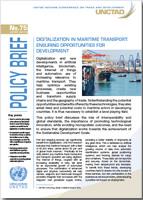
Digitalization and new developments in artificial intelligence, blockchain, the Internet of things and automation, are of increasing relevance to maritime transport.
They help optimize existing processes, create new business opportunities and transform supply chains and the geography of trade.
Notwithstanding the potential opportunities and benefits offered by these technologies, they also entail risks and potential costs to maritime actors in developing countries. It is thus necessary to establish a level playing field.
This policy brief discusses the role of interoperability and global standards, the importance of promoting technological innovation, while avoiding monopolistic outcomes, and the need to ensure that digitalization works towards the achievement of the Sustainable Development Goals.
Key points:
-
There is a need for policy design at the national and international levels to ensure that developing countries can benefit from the digitalization of maritime transport.
-
It is important to provide support for innovation at home, as policies that facilitate access to cutingedge technologies can affect the trade competitiveness of importers and exporters.
-
Developing countries need to build institutional capacity in competition and data protection.
-
Policymakers can facilitate cooperation by promoting national collaborative platforms.


